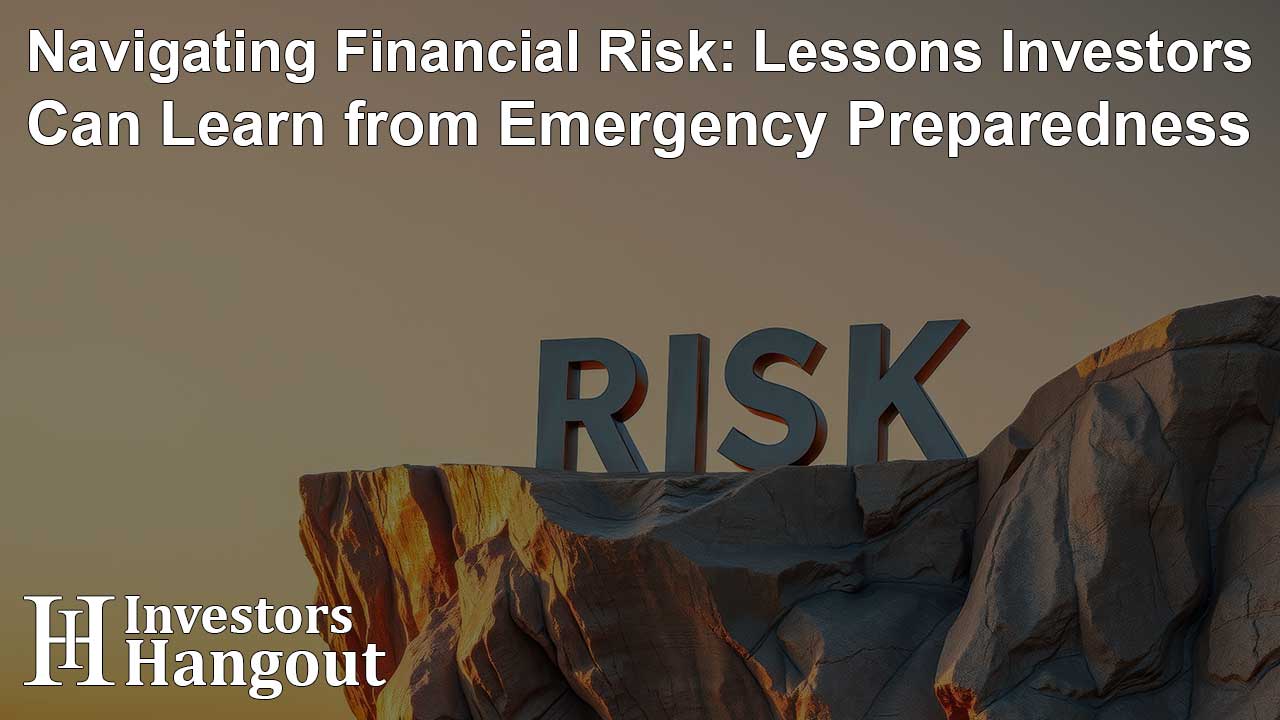Navigating Financial Risk: Lessons Investors Can Learn from Emergency Preparedness

Investing is as much about preparation as it is about opportunity. In the fast-paced world of stocks, real estate, and emerging markets, a single unexpected event can dramatically impact your portfolio. While investors often focus on market trends, earnings reports, and technical analysis, one of the most overlooked aspects of long-term success is preparing for the unexpected. Whether it’s a sudden market crash, a geopolitical conflict, or a global economic disruption, those who plan ahead are the ones who thrive.
Just as emergency responders train for crises to save lives, investors must cultivate the mindset and tools to navigate financial uncertainty. The lessons drawn from emergency preparedness can provide a roadmap for building a resilient, adaptable portfolio.
Understanding Risk Beyond the Numbers
Traditional investment strategies often quantify risk in terms of volatility, beta, or market fluctuations. While these metrics are useful, they fail to capture real-life unpredictability. Economic shocks, regulatory changes, or sudden shifts in consumer behavior can dramatically affect even the most diversified portfolios.
Investors who treat risk as purely numerical may be unprepared when unexpected events occur. Emergency preparedness provides a compelling analogy. Communities benefit from trained responders ready for any crisis; likewise, investors benefit from having contingency strategies, emergency funds, and diversification plans in place. Planning for the unknown can mean the difference between recovering quickly from a downturn or suffering permanent financial loss.
Diversification: Your Safety Net
One of the most practical lessons investors can borrow from emergency preparedness is the importance of redundancy. In personal safety, multiple tools and techniques—fire extinguishers, evacuation plans, and first aid kits—enhance survival. In investing, diversification serves a similar purpose. By spreading your investments across sectors, asset classes, and geographies, you reduce the impact of a single adverse event.
Diversification isn’t just about avoiding losses—it’s about creating resilience. For example, an investor with a mix of equities, bonds, and alternative assets may withstand a stock market decline better than one fully invested in a single industry. When one part of your portfolio underperforms, others can provide stability, allowing you to avoid panic-driven decisions and maintain confidence in your long-term strategy.
The Value of Training: Skills That Save
Preparedness isn’t only about resources; it’s also about knowledge and skills. Investors who continuously educate themselves—through financial courses, market analysis workshops, or mentorship—are better equipped to respond to volatility. In this context, consider a broader perspective: just as learning practical skills like a CPR first aid certification can prepare individuals for emergencies, cultivating financial literacy equips investors to respond effectively during market crises.
Financial training can include understanding risk management techniques, learning to read economic indicators, or gaining insights into emerging technologies and industries. These skills allow investors to recognize warning signs early and make proactive adjustments rather than reacting hastily to market movements.
Scenario Planning: Thinking Ahead
Scenario planning is another strategy borrowed from emergency management. Investors can simulate various market conditions, such as sudden interest rate hikes, global supply chain disruptions, or unexpected regulatory changes, and develop strategies for each outcome. Scenario planning forces you to think critically and avoid reactive decision-making—a skill that’s invaluable during volatile periods.
By anticipating challenges and having multiple strategies in place, investors gain confidence in their decisions. Much like emergency responders train in simulated disasters, practicing scenario-based investment strategies reduces the likelihood of costly mistakes when the real world throws curveballs.
Emotional Discipline: Staying Calm Under Pressure
Investors often face emotional challenges that can derail even the most carefully crafted strategies. Fear and greed are powerful forces, and impulsive decisions often result in significant losses. Learning to maintain calm under pressure, much like first responders do during a crisis, allows investors to execute pre-planned strategies with clarity and composure.
Building emotional resilience involves developing routines, setting clear investment goals, and periodically reviewing your portfolio to stay grounded. Combining emotional discipline with preparation and knowledge ensures a higher likelihood of long-term success and helps investors avoid decisions driven by temporary market noise.
Conclusion: Preparing Today for a More Secure Tomorrow
Investing isn’t just about seizing opportunities—it’s about preparing for risks, understanding uncertainties, and cultivating the skills needed to respond effectively. By applying lessons from emergency preparedness—diversification, training, scenario planning, and emotional discipline—investors can create a resilient portfolio capable of withstanding market turbulence.
Whether it’s financial shocks, geopolitical events, or market downturns, those who plan ahead are more likely to protect their wealth and capitalize on opportunities when they arise. Taking small steps today, such as enhancing financial knowledge, refining diversification strategies, or practicing scenario planning, can pay significant dividends in the long run.
Just as emergency responders save lives through preparation and training, informed and disciplined investors safeguard their financial futures by treating risk as both a challenge and an opportunity. Being proactive rather than reactive ensures that when the next market surprise arrives, you’re ready not just to survive—but to thrive.
About The Author
Contact Thomas Cooper privately here. Or send an email with ATTN: Thomas Cooper as the subject to contact@investorshangout.com.
About Investors Hangout
Investors Hangout is a leading online stock forum for financial discussion and learning, offering a wide range of free tools and resources. It draws in traders of all levels, who exchange market knowledge, investigate trading tactics, and keep an eye on industry developments in real time. Featuring financial articles, stock message boards, quotes, charts, company profiles, and live news updates. Through cooperative learning and a wealth of informational resources, it helps users from novices creating their first portfolios to experts honing their techniques. Join Investors Hangout today: https://investorshangout.com/
